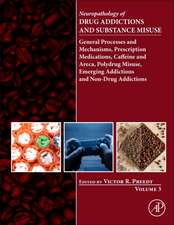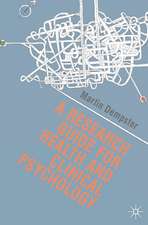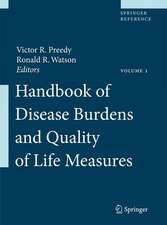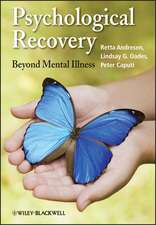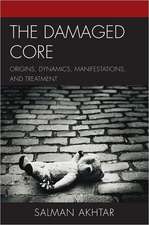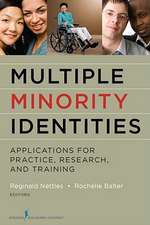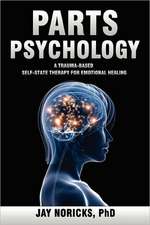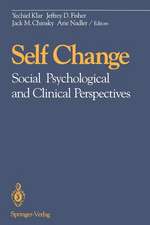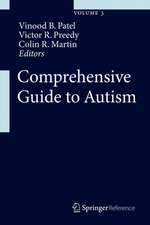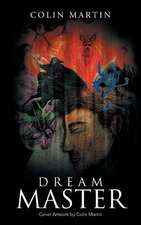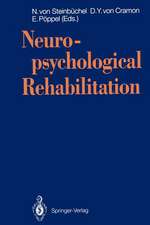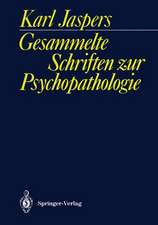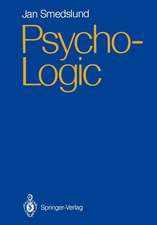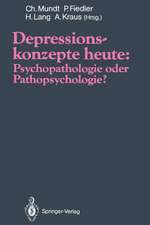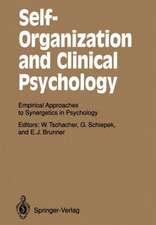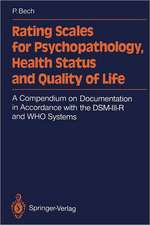Handbook of Anger, Aggression, and Violence
Editat de Colin R. Martin, Victor R. Preedy, Vinood B. Patelen Limba Engleză Hardback – 24 aug 2023
The book is divided into eight sections:
- Placing Aggression, Anger, Aggression and Violence In Context
- Causes and Precipitation of Anger, Aggression and Violence
- Features of Anger, Aggression and Violence
- Anger, Aggression and Violence in Defined Disorders and Conditions
- Physical Measures of Pathology and Insights: Genetics
- Physical Measures of Pathology and Insights: Non-Genetic
- Treatments and Therapies
- Methods and Techniques
Preț: 5896.82 lei
Preț vechi: 6207.18 lei
-5% Nou
Puncte Express: 8845
Preț estimativ în valută:
1128.39€ • 1206.60$ • 940.80£
1128.39€ • 1206.60$ • 940.80£
Carte disponibilă
Livrare economică 27 martie-10 aprilie
Preluare comenzi: 021 569.72.76
Specificații
ISBN-13: 9783031315466
ISBN-10: 3031315464
Pagini: 3082
Ilustrații: XLIX, 3082 p. 289 illus., 188 illus. in color. In 4 volumes, not available separately.
Dimensiuni: 155 x 235 mm
Greutate: 5.31 kg
Ediția:1st ed. 2023
Editura: Springer International Publishing
Colecția Springer
Locul publicării:Cham, Switzerland
ISBN-10: 3031315464
Pagini: 3082
Ilustrații: XLIX, 3082 p. 289 illus., 188 illus. in color. In 4 volumes, not available separately.
Dimensiuni: 155 x 235 mm
Greutate: 5.31 kg
Ediția:1st ed. 2023
Editura: Springer International Publishing
Colecția Springer
Locul publicării:Cham, Switzerland
Cuprins
1. Placing Aggression, Anger, Aggression and Violence In Context.- The general population and mental health correlates of anger.- Antisocial history and adult antisocial behavior.- Varieties of anger.- Violence and women (non sexual).- Sexual violence.- Features of youth violence.- Schools and aggression.- Violence in schools.- Relationship proximity and violence.- Predatory violence and homicide.- How we respond to angry faces.- The modern age: Cyberbullying (peer Victimization) as a form of aggression.- Adolescents, aggression and cyberbullying.- Violence and child soldiers.- Combat exposure and aggression.- 2. Causes and Precipitation of Anger, Aggression and Violence.- Alcohol and aggression.- Crawling experiences and the development of anger expression.- Ethnopolitical violence exposure and and children's aggression.- Isolation-induced aggressive behaviors.- Depression induced aggression.- Pornography and sexual violence.- Aggression and video games.- 3. Features of Anger, Aggression and Violence.- Facial recognition of fear in aggressive patients.- Facial image identification and the position of aggression using a 2D/3D superimposition technique.- Diet and anger.- Culture and anger expression.- The interrelationship between anger control, trait anger, and motor control.- Violence an aggression by males and impact on females.- Partner violence and aggression management.- Anger trait in cooperativeness and depression.- Community violence and academic attainment.- Bullying as a form of psychological aggression.- The aggressive-disruptive child and school outcomes.- How psychiatry perceive adolescent aggressive behavior.- 4. Anger, Aggression and Violence in Defined Disorders and Conditions.- Aggression in attention deficit hyperactivity disorder (ADHD).- Anger and cigarette smoking behavior.- Aggression in heroin addiction.- Aggression in adolescent psychiatric inpatients.- Anger in post-illness: the example of stroke.- Anger in autism.- Aggression in patients with schizophrenia.- Aggression in bipolar disorder.- Aggression in epilepsy.- 5. Physical Measures of Pathology and Insights: Genetics.- The 5-HTTLPR genotype and aggression.- MAOA and MAOB polymorphisms and anger.- Polymorphism in the 5HT2A Serotonin Receptor Gene.- Transcriptomics and aggression in females: a focus on primates.- 6. Physical Measures of Pathology and Insights: Non-Genetic.- The magnocellular visual pathway and the position of anger and associated traits.- Serotonin neuron firing and aggression.- Dopaminergic neurons and aggression.- Hypocretin and melanin-concentrating hormone and aggression.- Cholesterol and aggression.- Testosterone and aggressive behavior.- Caffeine and aggression.- Facial image identification using a 2D/3D superimposition technique.- 7. Treatments and therapies.- Group anger management.- The role of the therapist in to curtail violent batterers.- Neurofeedback techniques for controlling anger.- Topiramate (Topamax) therapy for aggressive behavior.- Use of clozapine in aggressive behavior.- Use of mindfulness-based treatments for aggression.- Electroconvulsive therapy and aggression.- Interpersonal reconstructive therapy and aggression.- 8. Methods and Techniques.- The predictive validity of assessment platforms for imminent aggression.- Anger recognition.- The Buss-Durke Inventory for aggression.- The Modified Overt Aggression Scale and its applications.- The Psychopathic Personality Inventory.- The Impulsive/Premeditated Aggression Scale.- The Dutch Reactive Proactive Questionnaire for Reactive and Proactive Aggression.
Notă biografică
Colin R. Martin RN, BSc, MSc, PhD, MBA, YCAP, FHEA, C.Psychol, AFBPsS, C.Sci is Professor of Clinical Psychobiology and Applied Psychoneuroimmunology and Clinical Director of the Institute of Health and Wellbeing at the University of Suffolk, UK. He is a Chartered Health Psychologist and a Chartered Scientist. He also trained in analytical biochemistry, this aspect reflecting the psychobiological focus of much of his research within mental health. He has published or has in press well over 300 research papers and book chapters. He is a keen book author and editor having written and/or edited more than 50 books. These outputs include the prophetic insight into the treatment of neurological disease, Handbook of Behavior, Food and Nutrition (2011), Nanomedicine and the Nervous System (2012), Oxidative Stress and Dietary Antioxidants in Neurological Disease (2020), Zika Virus Impact, Diagnosis, Control and Models (2021), Factors Affecting Neurodevelopment: Genetics, Neurology, Behavior and Diet (2021), Diagnosis and Treatment of Spinal Cord Injury (2022), The Neurobiology, Physiology, and Psychology of Pain (2022) and The Handbook of Lifespan Cognitive Behavioral Therapy: Childhood, Adolescence, Pregnancy, Adulthood, and Aging (2023). Professor Martin is particularly interested in all aspects of the relationship between underlying physiological substrates and behavior, including the manifestation of anger, aggression and violence. His clinical and research work has included examining factors associated with these relationships within the high secure forensic mental health environment in the UK. He is currently undertaking primary research examining the constellation of factors associated with the index offences, including those characterized by violence and aggression, of female prisoners. He is involved in collaborative International research with many European and Non-European countries.
Victor R. Preedy BSc, PhD, DSc, FRSB, FRSPH, FRSC, FRCPath is Professor of Clinical Biochemistry (Hon) at King’s College Hospital and Emeritus Professor of Nutritional Biochemistry at King’s College London. He has an Honorary Professorship at the University of Hull and was the long-term Director of the Genomics Centre at King’s College London from 2006 to 2020. Professor Preedy graduated with an Honours Degree in Biology and Physiology with Pharmacology. After gaining his University of London PhD, he received his Membership of the Royal College of Pathologists. He was later awarded his second doctorate (DSc), for his contribution to protein metabolism in health and disease. Professor Preedy has been awarded fellowships of the Royal Society of Biology, the Royal College of Pathologists, the Royal Society for the Promotion of Health, the Royal Institute of Public Health, the Royal Society for Public Health, and the Royal Society of Chemistry. Professor Preedy has academic interests in molecular and physiological processes and how they interlink with mental health and behavioral wellbeing. He carried out research when attached to the National Heart Hospital (part of Imperial College London), The School of Pharmacy (now part of University College London) and the MRC Centre at Northwick Park Hospital. He has collaborated with international research groups in Finland, Japan, Australia, USA, and Germany. Prof Preedy is a leading expert on the science of health and wellbeing. To his credit, Professor Preedy has published over 750 articles, which includes peer-reviewed manuscripts based on original research, abstracts and symposium presentations, reviews and edited books. Vinood B. Patel, BSc, PhD, FRSC, is currently a Reader in Clinical Biochemistry at the University of Westminster. He has interests in metabolic pathways particularly related to mitochondrial energy regulation. Research is being undertaken to study the role of nutrients, antioxidants, phytochemicals, iron, alcohol and fatty acids in the pathophysiology of liver, gut and neurological conditions. Other areas of interest are identifying new biomarkers that can be used for the diagnosis and prognosis of liver disease and understanding gastrointestinal dysfunction in autism. Dr Patel graduated from the University of Portsmouth with a degree in Pharmacology and completed his PhD in protein metabolism from King’s College London in 1997. His postdoctoral work was carried out at Wake Forest University Baptist Medical School studying structural-functional alterations to mitochondrial ribosomes, where he developed novel techniques to characterize their biophysical properties. Dr Patel is a nationally and internationally recognized researcher and has edited several biomedical books. These books include Post traumatic stress disorder, Comprehensive guide to Autism, The Handbook of Nutrition, Diet, and Epigenetics, Branched Chain Amino Acids in Clinical Nutrition, Cancer: Oxidative Stress and Dietary Antioxidants, Diet Quality: An Evidence-Based Approach, Handbook of Cognitive Behavioral Therapy. In 2014 Dr Patel was elected as a Fellow to The Royal Society of Chemistry.
Caracteristici
A detailed overview of the emotional, physical, and social implications of anger, aggression, and violence
Covers a range of aggressive behaviors
Includes Translational aspects: Applications of the material, Key Facts, Summary Points and Case studies
Covers a range of aggressive behaviors
Includes Translational aspects: Applications of the material, Key Facts, Summary Points and Case studies


